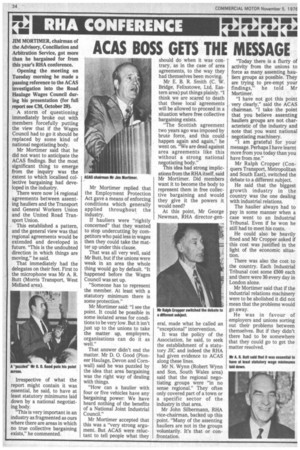ACAS BOSS GETS THE MESSAGE
Page 36

If you've noticed an error in this article please click here to report it so we can fix it.
JIM MORTIMER, chairman of the Advisory, Conciliation and Arbitration Service, got more than he bargained for from this year's RHA conference.
Opening the meeting on Tuesday morning he made a passing reference to the ACAS investigation into the Road Haulage Wages Council during his presentation (for full report see CM, October 29).
A storm of questioning immediately broke out with members forcefully putting the view that if the Wages Council had to go it should be replaced by some kind of national negotiating body.
Mr Mortimer said that he did not want to anticipate the ACAS findings. But the most significant thing to emerge from the inquiry was the extent to which localised collective bargaining had developed in the industry.
There were now 14 regional agreements between assenting hauliers and the Transport and General Workers Union and the United Road Transport Union.
This established a pattern, and the general view was that regional agreements would be extended and developed in future. "This is the undoubted direction in which things are moving," he said.
That immediately had the delegates on their feet. First to the microphone was Mr A. R. Butt (Morris Transport, West Midland area).
Irrespective of what the• report might contain it was essential, he said, to have at least statutory minimums laid down by a national negotiating body.
"This is very important in an industry as fragmented as ours where there are areas in which no true collective bargaining exists," he commented. Mr Mortimer replied that the Employment Protection Act gave a means of enforcing conditions which generally applied throughout the industry.
If hauliers were "rightly concerned" that they wanted to stop undercutting by competitors who paid less in wages then they could take the matter up under this clause.
That was all very well, said Mr Butt, but if the unions were weak in an area the whole thing would go by default. "It happened before the Wages Council was set up.
"Someone has to represent the member. At least with a statutory minimum there is some protection."
Mr Mortimer said: "I see the point. It could be possible in some isolated areas for conditions to be very low. But it isn't just up to the unions to take the matter up, employers, organisations can do it as well."
That answer didn't end the matter. Mr D. 0. Good (Pioneer Haulage, Devon and Cornwall) said he was puzzled by the idea that area bargaining was the right way of dealing with things.
"How can a haulier with • four or five vehicles have any bargaining power: We have heard nothing of the benefits of a National Joint Industrial Council."
Mr Mortimer accepted that this was a "very strong argument. But ACAS were reluctant to tell people what they should do when it was contrary, as in the case of area agreements, to the way they had themselves been moving.
Mr E. B. R. Smith (C. W. Bridge, Felixstowe, Ltd, Eastern area) put things plainly. "I think we are scared to death that these local agreements will be allowed to proceed in a situation where free collective bargaining exists.
"The Scottish agreement two years ago was imposed by brute force, and this could happen again and again," he went on. "We are dead against area agreements like this without a strong national negotiating body."
This idea had strong implications from the RHA itself, said Mr Mortimer. Did members want it to become the body to represent them in free collective bargaining and would they give it the powers it would need?
At this point, Mr George Newman, RHA director-gen eral, made what he called an "exceptional" intervention.
It was the policy of the Association, he said, to seek the establishment of a statutory JIC and indeed the RHA had given evidence to ACAS along these lines.
Mr N. Wynn (Robert Wynn and Son, South Wales area) said that the regional negotiating groups were "in no sense regional." They often only covered part of a town or a specific sector of the industry in that area.
Mr John Silbermann, RHA vice-chairman, backed up this point. "Many of the assenting hauliers are not in the groups voluntarily. It's that or confrontation. "Today there is a flurry of activity from the unions to force as many assenting hauliers groups as possible. They are trying to pre-empt your findings," he told Mr Mortimer.
"I have not got this point very clearly," said the ACAS chairman. "I take the point that you believe assenting hauliers groups are not characteristic of the industry and note that you want national negotiating machinery.
"I am grateful for your message. Perhaps I have learnt more from you today than you have from me."
Mr Ralph Cropper (Conquers Transport, Metropolitan and South East), switched the debate to a different subject.
He said that the biggest growth industry in the country was the one dealing with industrial relations.
The haulier always had to pay in some manner when a case went to an Industrial Tribunal. Even if he won he still had to meet his costs.
He could also be heavily fined and Mr Cropper asked if this cost was justified in the light of the economic situation.
There was also the cost to the country. Each Industrial Tribunal cost some £500 each and there were 30 every day in London alone.
Mr Mortimer said that if the industrial relations machinery were to be abolished it did not mean that the problems would go away.
He was in favour of employers and unions sorting out their problems between themselves. But if they didn't there had to be somewhere that they could go to get the matter resolved.
































































































